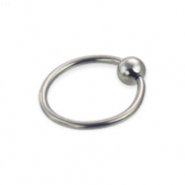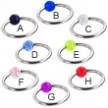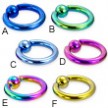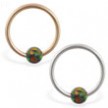Captive Bead Ring, 16 Ga
- Gauge (Thickness): 16 (1.2mm)
- Material: 316L surgical grade stainless steel
- Type: captive bead ring
Shown: 13mm captive ring with 4mm ball.
| Click on the picture to see a big picture and description of the body jewelry you are interested in. | |||||||||
|---|---|---|---|---|---|---|---|---|---|
|
Captive bead ring with glitter ball,...
$2.99
Captive bead ring with glitter ball, 14 ga
|
14K Gold captive bead ring with...
$65.00
14K Gold captive bead ring with Emerald
|
Titanium anodized captive bead ring, 8...
$10.99
Titanium anodized captive bead ring, 8 ga
|
14K Gold captive bead ring with...
$50.99
14K Gold captive bead ring with rainbow opal ball
|
||||||
Gold
Solid gold of at least 14 karat (58.3% gold). Some piercers prefer to use only 18k gold (75% gold) in fresh piercings.
Gold-filled and gold-plated or jewelry is not appropriate. The gold plate is very thin and can wear away quickly with the friction to which body jewelry is exposed.
Some people are sensitive to the alloys present in karat gold (namely nickel, silver, zinc and copper) and cannot tolerate wearing gold jewelry.
Some people’s pH (in oral and genital tissues, perspiration) is acidic enough to corrode the alloys in karat gold, evident by blackening of the jewelry and discoloration of the surrounding skin.
White gold often causes more adverse reactions than yellow gold of the same karat because a higher concentration of nickel is used to yield the white color. White gold alloyed with palladium, an inert metal of the platinum group, instead of nickel is preferable for wear in new piercings. Some people who cannot wear steel alloys can wear 18k white gold palladium alloys.
Green or pink gold should not be worn because of the higher concentration of copper and zinc used to produce the color.
Gold jewelry may acquire a surface discoloration when exposed to iodine (Betadine) and when autoclaved. Use of heat indicator packaging or tape often results in discoloration. This discoloration is not true oxidation, which only takes place at the melting point of the alloys present. Jewelry discolored by iodine or heating can be repolished to its previous shine.
Over a long period of time gold jewelry exposed to urine may acquire a rough, dull surface. The acids found in urine leach into the surface and dries to form a hard crust. Buffing or polishing the jewelry will remove this build- up. Daily cleaning of the jewelry will prevent this build-up.




